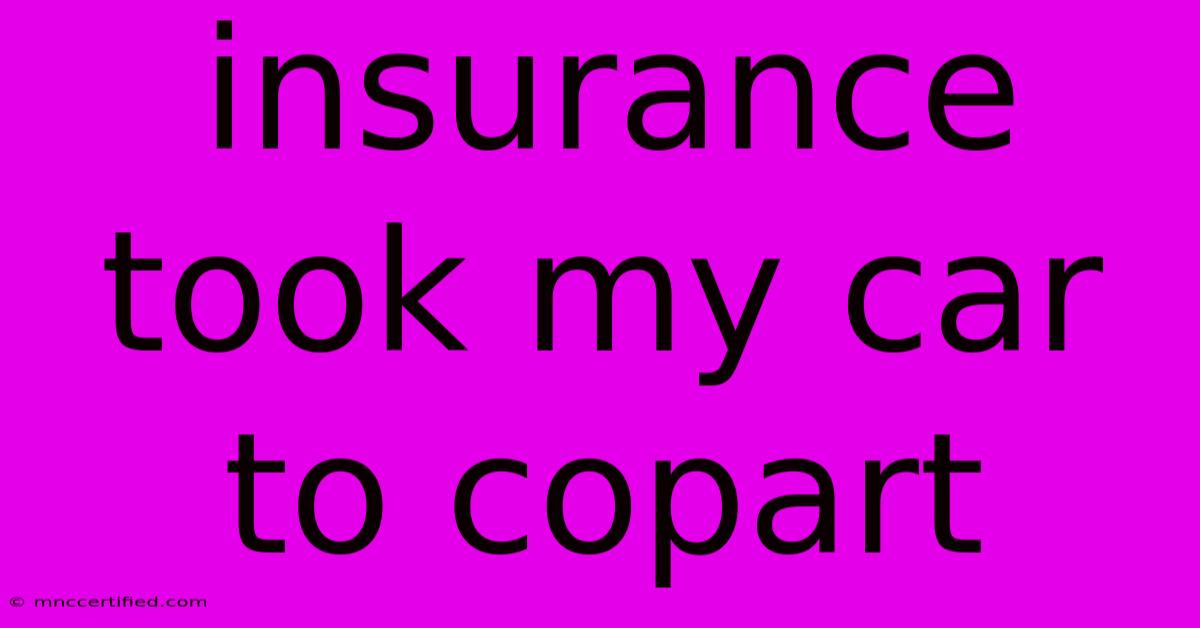Insurance Took My Car To Copart

Table of Contents
Insurance Took My Car to Copart: What You Need to Know
Your insurance company deemed your car a total loss, and now it's sitting in a Copart lot. This situation can be confusing and frustrating, but understanding the process is crucial to protecting your rights and getting the best possible settlement. This guide will walk you through what to expect when your insurance company sends your vehicle to Copart, and how to navigate this often complicated process.
Understanding the Copart Auction Process
Copart is one of the largest online salvage auction companies in the world. Insurance companies frequently use Copart (and similar companies like IAA) to auction off vehicles declared total losses. This is often the most cost-effective way for them to dispose of damaged vehicles. Your insurance company likely sold your car to Copart, not directly to the auction itself. They're essentially acting as a middleman.
What Happens After Your Car is Sent to Copart?
Once your car reaches Copart, it's photographed, inspected, and listed online with details about its damage. This information, including photos and a damage report, is crucial in determining the vehicle's actual cash value (ACV). You should actively seek access to this information.
Accessing Your Vehicle's Information on Copart
You can usually access your vehicle's information on the Copart website by using the vehicle identification number (VIN). You may need to register for a free account. However, keep in mind you might not have direct access depending on your insurance company's agreement with Copart. You might need to obtain this information through your insurance adjuster.
Negotiating Your Settlement After a Total Loss
Even if your car is at Copart, the negotiation process isn't necessarily over. The amount your insurance company offers you is often based on the estimated ACV and salvage value of your vehicle. The salvage value is what Copart (or a similar auction company) expects to get from the auction.
Challenging the Settlement Amount
If you believe the offered settlement is too low, you have grounds to negotiate. Gather as much information as possible:
- Comparable vehicle values: Use online resources like Kelley Blue Book (KBB) and Edmunds to find similar vehicles in your area and their current market prices.
- Repair estimates: If the damage wasn't truly catastrophic, obtain repair estimates from multiple mechanics. This helps show that the vehicle could potentially be repaired for less than the offered settlement.
- Copart vehicle listing: Analyze the Copart listing for your vehicle, including the photos and damage description. This can help you understand the extent of the damage and counter any claims of significant damage.
- Documentation: Gather all relevant documentation, including your insurance policy, the initial accident report, and communication with your insurance adjuster.
Armed with this information, you can confidently negotiate a better settlement. Be prepared to provide evidence supporting your claim.
Recovering Your Personal Belongings
If you left personal belongings in your vehicle, you should immediately contact your insurance company and Copart. They may have procedures for retrieving your items. Act quickly, as these items may not be stored indefinitely.
Keywords for SEO Optimization
- Insurance total loss
- Copart auction
- Salvage vehicle
- Car accident
- Total loss settlement
- Vehicle valuation
- Insurance claim
- Negotiating insurance settlement
- Actual cash value (ACV)
- Salvage value
- Vehicle identification number (VIN)
- IAA auction
Off-page SEO strategies: Promoting this article on relevant forums, social media groups (focused on cars and insurance), and guest posting on car-related blogs will significantly boost its visibility and ranking. Building high-quality backlinks from reputable websites is crucial for SEO success.
This comprehensive guide provides valuable information for anyone facing the frustrating situation of having their car sent to Copart after an insurance claim. Remember to be proactive, organized, and persistent in navigating this process to ensure you receive a fair settlement.

Thank you for visiting our website wich cover about Insurance Took My Car To Copart. We hope the information provided has been useful to you. Feel free to contact us if you have any questions or need further assistance. See you next time and dont miss to bookmark.
Featured Posts
-
Brewer Insurance School Reviews
Nov 24, 2024
-
Slater Grande Erivo Emotional Reaction Explained
Nov 24, 2024
-
Haltom Insurance Haltom City Tx
Nov 24, 2024
-
Georgia Vs U Mass Final Odds And Prediction
Nov 24, 2024
-
Georgia Crushes U Mass Game Recap
Nov 24, 2024